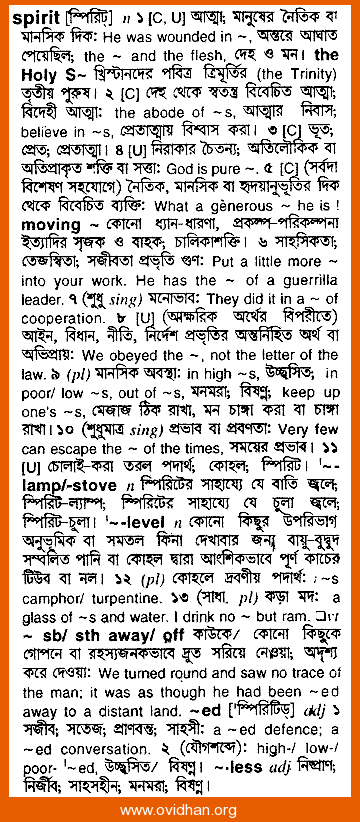| Spirit: English to Bangla |
 |
|
| Spirit: English to English | | Spirit (n.) A rough breathing; an aspirate, as the letter h; also, a mark to denote aspiration; a breathing. | | Spirit (n.) A solution in alcohol of a volatile principle. Cf. Tincture. | | Spirit (n.) Air set in motion by breathing; breath; hence, sometimes, life itself. | | Spirit (n.) Any liquid produced by distillation; especially, alcohol, the spirits, or spirit, of wine (it having been first distilled from wine): -- often in the plural. | | Spirit (n.) Any one of the four substances, sulphur, sal ammoniac, quicksilver, or arsenic (or, according to some, orpiment). | | Spirit (n.) Any supernatural being, good or bad; an apparition; a specter; a ghost; also, sometimes, a sprite,; a fairy; an elf. | | Spirit (n.) Energy, vivacity, ardor, enthusiasm, courage, etc. | | Spirit (n.) Intent; real meaning; -- opposed to the letter, or to formal statement; also, characteristic quality, especially such as is derived from the individual genius or the personal character; as, the spirit of an enterprise, of a document, or the like. | | Spirit (n.) Life, or living substance, considered independently of corporeal existence; an intelligence conceived of apart from any physical organization or embodiment; vital essence, force, or energy, as distinct from matter. | | Spirit (n.) One who is vivacious or lively; one who evinces great activity or peculiar characteristics of mind or temper; as, a ruling spirit; a schismatic spirit. | | Spirit (n.) Rum, whisky, brandy, gin, and other distilled liquors having much alcohol, in distinction from wine and malt liquors. | | Spirit (n.) Specifically, a disembodied soul; the human soul after it has left the body. | | Spirit (n.) Stannic chloride. See under Stannic. | | Spirit (n.) Temper or disposition of mind; mental condition or disposition; intellectual or moral state; -- often in the plural; as, to be cheerful, or in good spirits; to be downhearted, or in bad spirits. | | Spirit (n.) Tenuous, volatile, airy, or vapory substance, possessed of active qualities. | | Spirit (n.) The intelligent, immaterial and immortal part of man; the soul, in distinction from the body in which it resides; the agent or subject of vital and spiritual functions, whether spiritual or material. | | Spirit (v. t.) To animate with vigor; to excite; to encourage; to inspirit; as, civil dissensions often spirit the ambition of private men; -- sometimes followed by up. | | Spirit (v. t.) To convey rapidly and secretly, or mysteriously, as if by the agency of a spirit; to kidnap; -- often with away, or off. | |